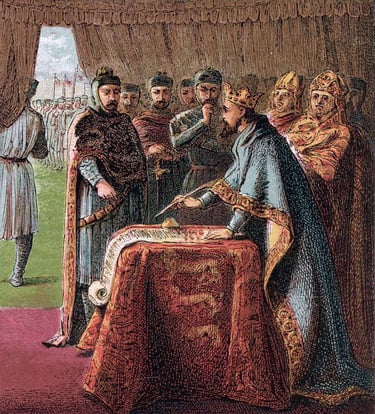The Magna Carta
The Magna Carta of 1215, initially a feudal concession forced upon King John by rebellious barons, marked a revolutionary assertion that even a monarch was subject to law, despite its immediate practical failure. Over centuries, this document evolved beyond its original context to become a powerful symbol of limited government, due process, and individual liberties. Its principles, particularly regarding fair trial and timely justice, profoundly influenced the development of the rule of law and inspired constitutional democracies worldwide, including the U.S. Constitution, cementing its legacy as an enduring symbol of legal limitation on power.
Emerging from a volatile period of discontent with tyrannical rule, the Great Charter of 1215 was initially a reluctant concession forced upon a reigning monarch by his rebellious barons. The document was an attempt to curb specific abuses of royal power, such as arbitrary taxation and imprisonment, and was born from a feudal struggle for defined rights and established customs rather than a grand vision of universal liberty. Despite its immediate practical failure—it was quickly annulled by the Pope and sparked civil war—its sealing at Runnymede represented an unprecedented moment: the formal articulation that even a king was subject to the law, thereby placing a significant, albeit challenged, check on absolute authority. This embryonic notion of limited government, revolutionary for its time, marked a fundamental shift in political thought, laying the foundational stone for the idea that legal principles could bind even the most powerful.
The enduring power of this historic charter, however, truly blossomed in later centuries through reinterpretation and symbolic adoption. Far from its specific feudal origins, it was gradually transformed into a beacon of freedom and due process, championed by later generations seeking to assert individual liberties against state overreach. Concepts such as the right to a fair trial by one's peers and the principle that justice should not be sold or delayed, though initially narrow in application, became cornerstones for the development of the rule of law. Its resonance extended globally, deeply influencing the formation of constitutional democracies, notably the framers of the United States Constitution and its Bill of Rights. Thus, what began as a pragmatic peace treaty evolved into an iconic testament to the principle that all power, ultimately, derives from and is limited by law.


